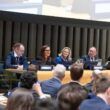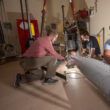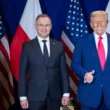For nuclear security, summits on the sidelines?
By Michael H. Fuchs, April 14, 2016
The fourth and final Nuclear Security Summit came and went without attracting enormous public notice—except from the residents of Washington, DC, who noticed some major traffic headaches. But the 2016 summit, like its predecessors, delivered meaningful progress in nuclear security. Additional support was pledged for nuclear security training. Joint statements were delivered regarding nuclear transportation security, cyber security, minimization of civilian highly enriched uranium, and a number of other issues. This represents steady progress. It's not exciting, but it's very, very necessary.
With the summit process now formally complete, it's time to consider how countries can continue the work of the summit process—short of holding biennial meetings at the head-of-state level. Actually, as I described in Round One, continuing the Nuclear Security Summits in their existing form would be my preference. Neither my roundtable colleagues nor the broader nuclear security community seem eager to pursue that idea. Nearly everyone, however, agrees that the summit process has been productive and that it deserves, in some form, to continue.
Indeed, participants in the 2016 summit already agreed to carry on the work of the summits through a number of global mechanisms that address related issues. Specifically, nations agreed on "action plans" that will be pursued through the United Nations, the International Atomic Energy Agency, the Global Initiative to Combat Nuclear Terrorism, Interpol, and the Global Partnership against the Spread of Weapons and Materials of Mass Destruction. These action plans are detailed, substantive guides for the coming years. If implemented, they can help sustain the progress that the summits achieved. Meanwhile, discussions about other ways forward for the summit process will be conducted among sherpas ("officially designated officials who represent[ed] their governments in preparations for the Nuclear Security Summits").
Yet these processes will likely be insufficient to ensure that states implement the decisions made over the last six years or that they make new commitments. If governments are to make tough decisions, action-forcing events are still required. Two plausible paths for forcing action present themselves.
The first is a variation on the existing format of biennial, head-of-state-level summits: Summits could take place every two years on the sidelines of the UN General Assembly. Already, every September, national leaders converge on New York for the annual gathering of the United Nations. Every year, many of those leaders participate in sideline summits and special events that shine a spotlight on issues deserving heightened attention. Such a format would provide one great advantage: Leaders would already be together in New York and would only need to dedicate a few extra hours to nuclear security. The disadvantage would be that most sideline meetings at the UN General Assembly are lost in a maelstrom of other meetings. So the media and relevant bureaucracies might pay inadequate attention to nuclear security summits held under this format.
An alternate approach would be for ministers of foreign affairs and energy, rather than heads of state, to hold biennial nuclear security meetings. These ministers have the authority to make decisions on many key issues in foreign policy and civilian nuclear programs, so their presence would ensure that decisions made at the meetings would have the support of relevant national agencies. Ministers are also senior enough to garner public attention.
It’s unlikely that any new format will be as effective as the summit format employed from 2010 to 2016. But sideline meetings among heads of state or dedicated summits among appropriate ministers would have a good chance of providing nations the incentives they need to continue making progress in nuclear security.
Topics: Nuclear Energy, Nuclear Weapons
Share: [addthis tool="addthis_inline_share_toolbox"]














